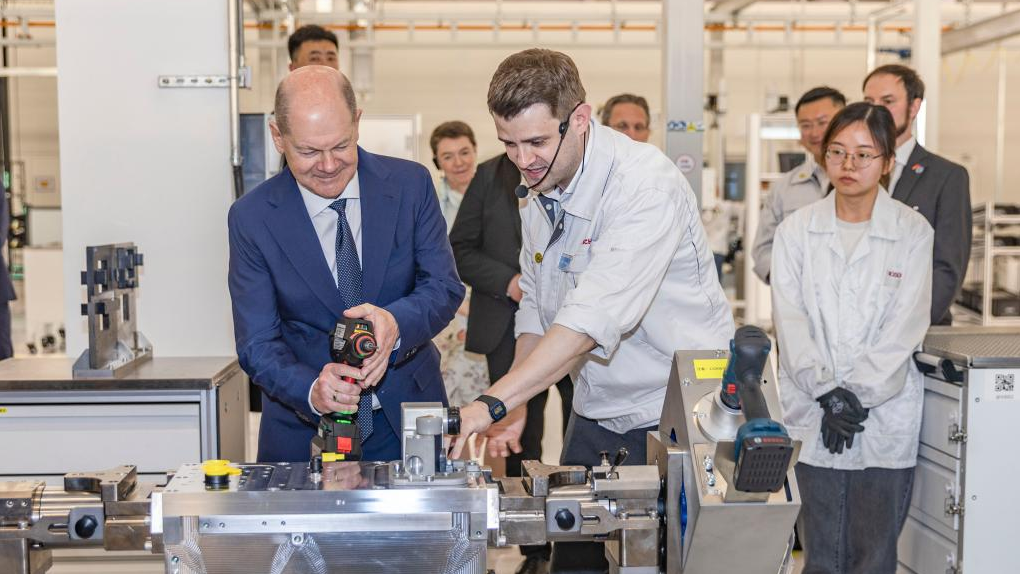By Feng Zhongping
Since the launch of the EU-China comprehensive strategic partnership in 2003, pragmatic cooperation between Beijing and European countries has entered the fast track. Chinese President Xi Jinping's Europe visit in early May has further demonstrated the significance of the relationship between China and the EU.
But in the meantime, at the instigation and coercion of Washington, the Beijing-Brussels relationship has experienced some setbacks.
In an attempt to contain China, U.S. President Joe Biden has been vigorously repairing transatlantic ties and wooing European countries into an anti-Beijing bloc via platforms including NATO and EU-U.S. summits. As a result of Washington's relentless efforts, forums such as the EU-U.S. Trade and Technology Council have been built to coordinate China policy. Worse still, an over-emphasis on economic and technological competition against China in Brussels' policy-making process, as well as ideological differences, have posed more challenges to China-EU relations.
In this context, the EU views China as a partner for cooperation, an economic competitor and a systemic rival, and thus some EU members have been calling for "de-risking" from Beijing. But despite the "triple positioning" of China as a partner, competitor and rival, an increasing number of European countries have become more pragmatic in their interactions with Beijing.
The EU's pragmatic attitude is not surprising considering the conundrums it is facing. Against the backdrop of the Ukrainian conflict, some European countries have witnessed soaring inflation rates and skyrocketing living costs. Several waves of demonstrations have swept across the European continent to protest against the sluggish economic growth. Under heavy economic and social pressure, voices against "decoupling" are becoming louder.
EU leaders' statements on ties with China are enough to prove their pragmatic attitude. For instance, German Chancellor Olaf Scholz made it clear on several occasions that "decoupling" is not in the interests of Germany and Europe. During his China visit in April, Scholz clarified that Germany has no plan to "decouple" from China.

Federal Chancellor of Germany Olaf Scholz visits Bosch Hydrogen Powertrain Systems (Chongqing) Co., Ltd. in Jiulongpo District of southwest China's Chongqing Municipality, April 14, 2024. [Photo/Xinhua]
French President Emmanuel Macron has repeatedly urged Europe to develop more strategic autonomy from Washington as a way to avoid the risk of turning European countries into "vassals." "The question Europeans need to answer is, is it in our interest to accelerate (a crisis) on Taiwan? No," Politico quoted Macron as saying.
European Council President Charles Michel emphasized that "it is very clear that we need to engage with China, not because we agree on everything with China; on the contrary, but because we need to defend our interests and to defend our principles." European Commission President Ursula von der Leyen claimed earlier that "our relationship with China is one of the most intricate and important anywhere in the world. And how we manage it will be a determining factor for our future economic prosperity and national security."
These statements indicate that despite its "triple positioning" of China as a partner, competitor and rival, the EU is clear about the importance of maintaining cooperative ties with China. To this end, European countries, instead of picking sides between Washington and Beijing, have been trying to interact with China based on their own interests. A majority of Europeans view China as a strategic partner more than a rival and would want to remain neutral in a possible conflict between Washington and Beijing, according to a survey the European Council on Foreign Relations conducted in 2023. More than 16,000 respondents from 11 EU countries including Germany, France, Italy, Austria and Bulgaria participated in the survey.
The significance of China-EU ties cannot be overstated. Official data indicates that China and the EU have remained as each other's second-largest trading partners, with nearly $100 million worth of goods flowing between them every hour. Since 2022, BMW, Volkswagen, Stellantis, BASF and many other large European multinationals have increased their investment in the Chinese market. China and the EU are also decisive forces influencing the world order and significant players in global governance.
Against this backdrop, enhancing communications between China and Europe is vital. The positioning of China as a "risk" is a direct result of Europe's misunderstandings of the country. Improving exchanges in areas including politics, economics and trade can help Beijing and Brussels view each other's development and intentions from an objective perspective, and President Xi's Europe visit is such an attempt.
The author is a special commentator on current affairs for CGTN.

 中文
中文



